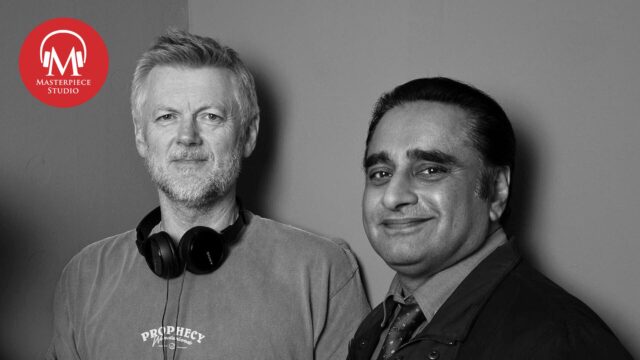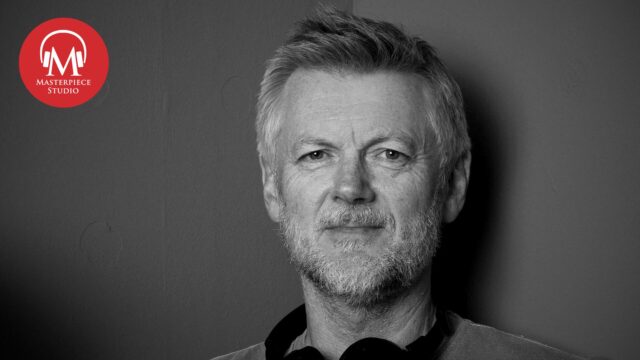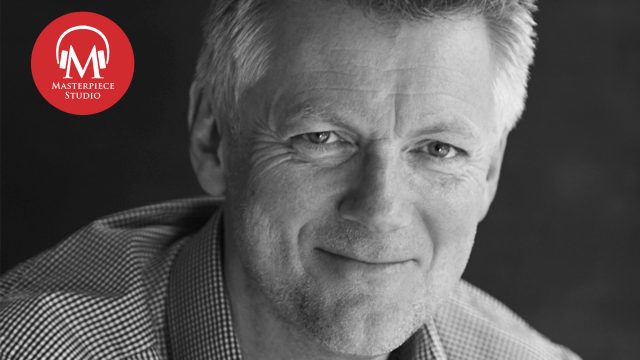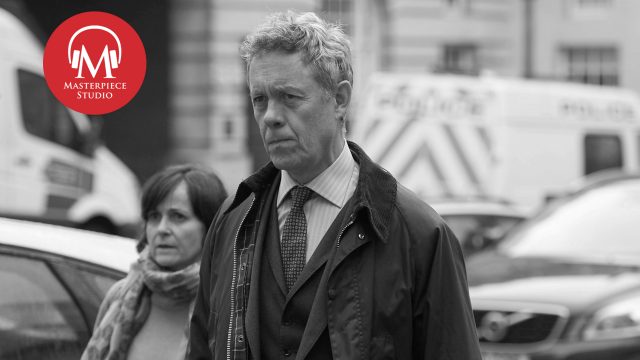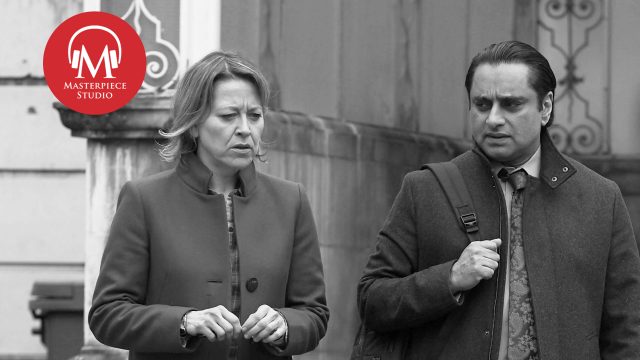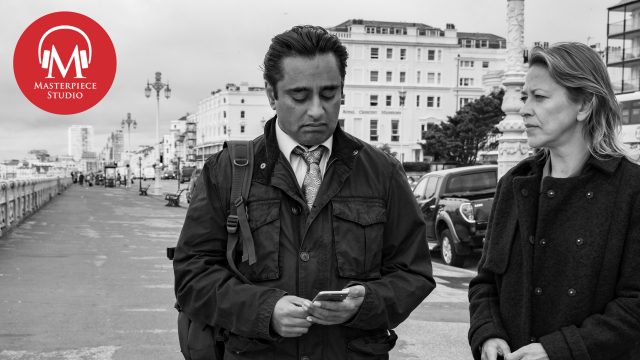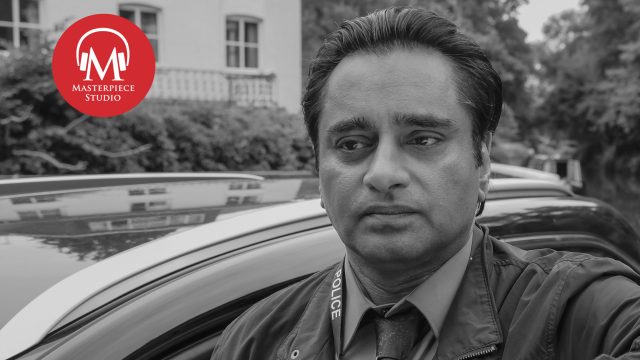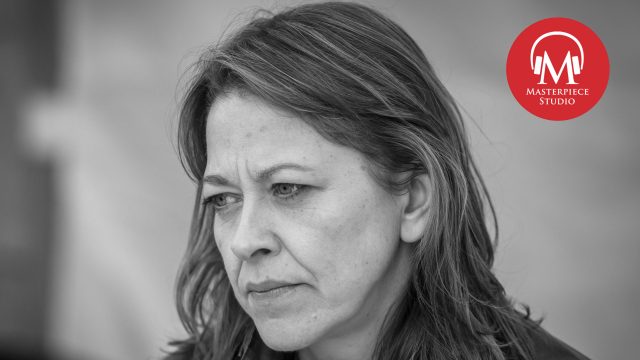At the end of Season 4 of Unforgotten DCI Cassie Stuart, played by Nicola Walker, tragically died in a car accident, sending shockwaves out to the other characters, actors, and viewers alike. But Sunny Khan is hit especially hard, given his close working relationship with Cassie. Sanjeev Bhaskar joins us to discuss how Sunny deals with this change, and what struggles and triumphs might lie ahead for his character this season.
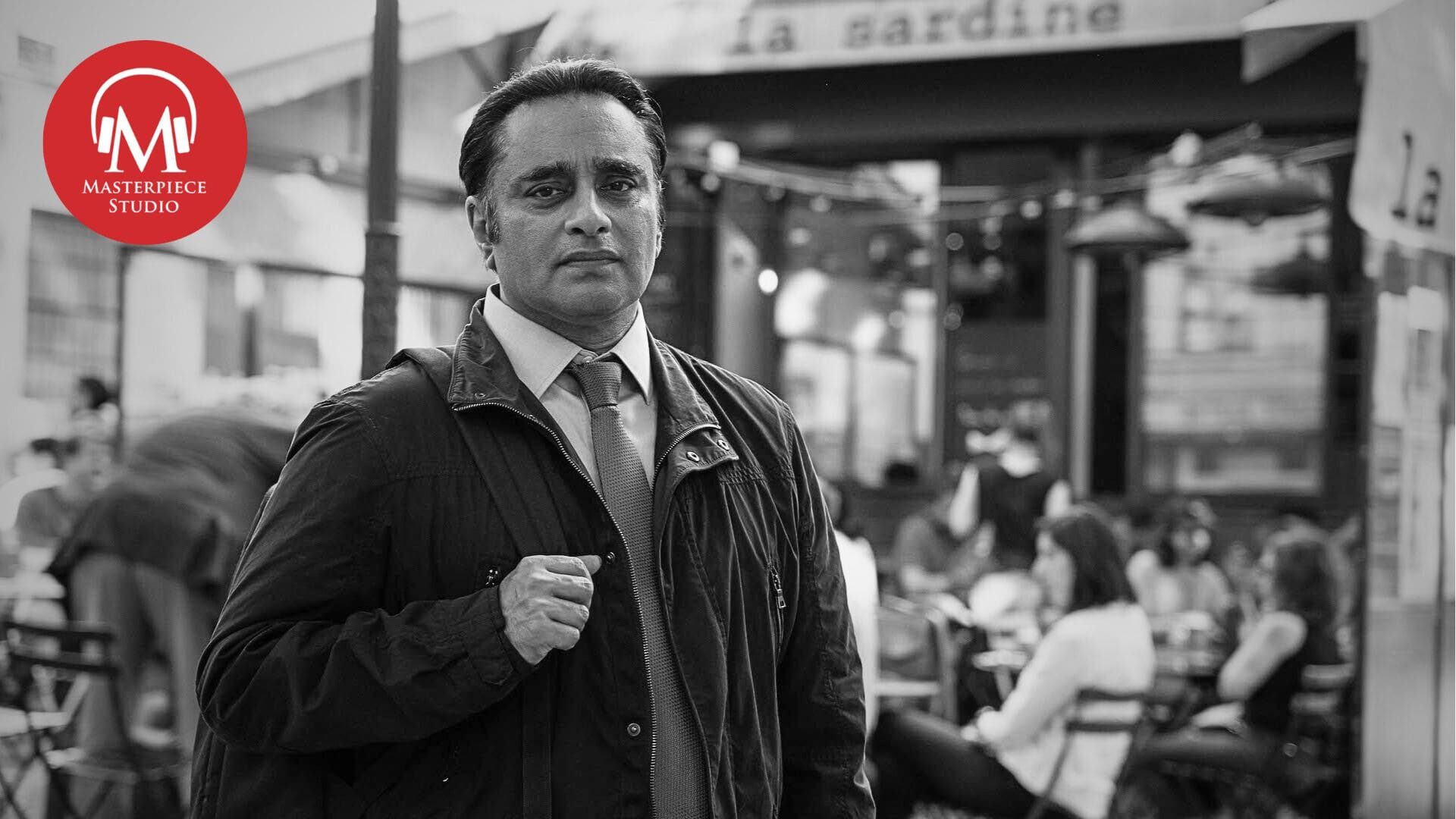

Unforgotten Star Sanjeev Bhaskar Previews The Changes To Come For Sunny Khan
Released 25:27
Download and subscribe on: iTunes | Spotify| RadioPublic
Transcript
This script has been lightly edited for clarity
Jace Lacob: I’m Jace Lacob, and you’re listening to MASTERPIECE Studio.
Over the last four seasons of Unforgotten, we’ve delighted in DI Sunny Khan and DCI Cassie Stuart’s beautifully nuanced partnership. For the past six years, they’ve worked brilliantly together solving cold cases, and building one of television’s very best friendships. But sadly, —and MAJOR SPOILER WARNING if you’ve not caught up on Unforgotten— Sunny and Cassie’s partnership came to a tragic end last season when Cassie was unexpectedly killed in a car accident.
After several interim DCIs, newly promoted copper Jessica James is assigned to fill the role vacated by Cassie’s death. At the start of Season 5 however, even before Jess begins working with the team, it’s clear that having a new DCI is going to take some getting used to.
CLIP
Sunny: Hey Fran.
Fran: Hey boss. I’ve just had a call from Hammersmith nick who have found suspected human remains on their patch.
Sunny: Right.
Fran: They found them in a chimney flue. They think they’ve been there a while.
Sunny: Okay well, text me the address. I’ll be right there.
Fran: Should I call DCI James?
Sunny: Oh yeah, wow, that’s today isn’t it? Yeah, I guess you should.
Fran: Okay. See you there in an hour then?
Sunny: Okay, good stuff. Thanks Fran.
The whole team is grieving the loss of their beloved colleague. But as much as we might want her to be, DCI James just isn’t Cassie. DI Khan is having a particularly hard time with the adjustment. He’s still in grief, and DCI James doesn’t make it any easier for him.
CLIP
Sunny: I think a woman in a chimney in a house with five kids doesn’t seem like a likely scenario
Karen: Yeah but, ditto our spinster.
Sunny: True, although—
Jess: What are you doing?
Sunny: Just going through the history of the house, ma’am.
Jess: Why? Her dress is ‘40s. We know that.
Sunny: Well, we know it was made in the 1940s, doesn’t necessarily mean that…
Jess: And the plasterboard was made sometime between 1951 and 1967. I just got the results.
Sunny: Right.
Jess: This isn’t therapy DI Khan. This isn’t your chance to somehow…I don’t know. Look, I am very sorry for the woman who died but it was at least 55 bloody years ago. Probably more so. Case is closed as of now.
As we kick off Season 5 of Unforgotten, actor Sanjeev Bhaskar joins us to talk about the rawness of this season, how his character adjusted to a new DCI, and what kinds of struggles and triumphs might lie ahead for Sunny Khan.
Jace Lacob: This week we are joined by Unforgotten star Sanjeev Bhaskar. Welcome.
Sanjeev Bhaskar: Thank you very much indeed.
Jace Lacob: I want to talk about the rather brilliant, talented, beloved elephant in the room, Nicola Walker. When did you learn that Cassie would be killed off at the end of series four of Unforgotten, and what was your initial reaction to that news?
Sanjeev Bhaskar: Well, firstly, I’m going to tell her that you referred to her as an elephant.
Jace Lacob: Only in the most beloved of ways.
Sanjeev Bhaskar: Well, actually the first person who told me was Nicola. She told me what was going to happen, and I was pretty shocked. Then I got the script and I read it, and I was pretty shocked again. And then we filmed the scenes and I was shocked doing the scenes. And then I watched the episode back and I was shocked again. So even being pre-shocked didn’t help by the time it was transmitted.
So, yeah, I mean, it was one of those things. I mean, I wasn’t party to those decisions and those conversations, but I know it’s a conversation that Nicola and Chris Lang, writer and producer, had had about where they could take Cassie from the point that we found her, really at the end of season three, but certainly going into season four.
So it was a conversation that seemed to have been based on artistic merit and character as opposed to kind of fondness for Nicola, which we all were. And you know, if it’s of any solace to anybody out there, Nicola and I have the same relationship off air that we have on air, and we’ve continued to do that. So, the last time I was in touch with her was about two weeks ago. So it’s one of those things, you know, it’s kind of in a way coming back into season five, I had to just think, well, this is the next part of this story.
Jace Lacob: It is in some ways the random nature of Cassie’s death that is so unnerving. I think a lot of crime dramas would’ve had a suspect run her down in order to tie her demise to the overarching plot. But not Unforgotten. Do you think that the random, almost chaotic nature of her death somehow renders Cassie’s demise perhaps even more agonizing for the audience, that kind of random nature of it?
Sanjeev Bhaskar: I think that’s absolutely right. I think that we sort of have a need for our heroic figures to have an heroic end, and something as ordinary and every day in the way that her death occurred, I think was unnerving.
There seemed to be two reactions to it. One was, why did she have to die? And I got asked that a lot on social media and I said, life is cruel and it’s unsuspecting and it’s random. And the other line was, well, why couldn’t she have just gone off into the sunset with her boyfriend and had a nice life? And you kind of go, yeah, you wish that for people that you know in real life. And then strange, weird, unpleasant, tragic things happen. And I think that you’re right. I think that was extremely unnerving for people.
Jace Lacob: I want to drill down on the notion of grief here a little more. Series five, it functions both as a return to form for Unforgotten; there’s a cold case corpse, here’s a bunch of suspects, people are acting suspiciously. But as you say, it is a really powerful meditation on grief. It’s clear just in this initial first episode back, how much Sunny is struggling in the face of loss. As an actor who’s having to channel that grief, how challenging was it to capture that, to live in that place day after day after day on this production?
Sanjeev Bhaskar: It certainly was a challenge in that I don’t think we had seen Sunny go there before, so he was kind of entering into new territory as far as the audience were concerned, and as far as me as an actor was concerned. You know, it was kind of strange for me that I turned up on set and Nicola wasn’t there because she’s been such a mainstay for so many years.
And the only thing that kind of helped that was how much we keep in touch and we talk outside of work. If I needed reassurance that she was still alive, I could just text her and send me an emoji or something. The challenge really was for me as the actor I suppose, was with this character that people have seen, can you believably go to those places and take the audience with you?
Jace Lacob: It’s the little details that really do capture that sense of loss; Sunny buying two coffees out of habit, or him gazing despondently at Cassie’s office chair. And I think in some ways, perhaps the hardest part of losing someone isn’t necessarily the big moments of powerful, cathartic emotion, but those small, terrifying ones that remind you of them being gone from your life. And I felt like this first episode back really captured both the big feelings that Sunny’s having and those sort of smaller, almost ‘out of habit’ things that he does, that coffee purchase every morning.
Sanjeev Bhaskar: I think you’re absolutely right. And also, it’s the nature of grief as well, is that it catches you unawares. It’s, as you say, it’s sometimes not the very big stuff. With friends that I’ve lost, it’ll be a song that’ll be playing on the radio on a playlist or something that’ll come up. And I’ll associate it with them and that’s when I’ll think of them. And there are other friends where I go places or I meet people and I think he would’ve loved to have heard about this. And so it just catches you at odd times.
And the interesting thing about grief is that it never really goes away. You just learn to place it somewhere. And we all kind of have to function. We are living in a society, we have to get up, we have to go to work, we have to make breakfast for our kids, or drop them at school or look after our parents. We have to do all that stuff. And in a way, the grief gets kind of put on a back burner of some kind, that you’ll deal with it when you can. And so those things, like a song coming up or buying an extra coffee or, all those things I think are the ones that catch you suddenly unawares.
And I think that’s the nature of it. As you say, movie grief is very melodramatic, and real grief isn’t. It’s like carrying a weight around all the time. It’s not fending off lightning bolts. And so I think that’s what Chris captured very well.
Jace Lacob: I was incredibly worried for whatever actor would be brought in to fill Cassie’s shoes, but wow, does Sinéad Keenan manage to create both a space and a tone for Jess that’s completely different to Cassie. I know that you and Sinéad had one previous credit in common, which was the comedy Porters. Did you reach out to Sinéad ahead of production to talk, or did you look to keep your distance in order to mirror that chasm between Sunny and Jess?
Sanjeev Bhaskar: Well the one time that we had worked together, we were facing each other for 30 seconds. We had a line each, and then she gets up and leaves. And that was it, and that was some years ago. She really had the most difficult job of anybody coming into this. And as you say, it’s an unenviable thing to try to take that role. But as soon as I found out she had been cast, I did get in touch with her. And I said, look, it suddenly strikes me that you, Sinéad, are going to be going through exactly the same thing as your character Jesse coming into this. You are coming into this cast and this production where everybody knows each other. Everyone loves the person who’s not there anymore and how are you going to win people over? And that’s exactly the same as Jesse.
So I said to her, well, look, do you want to meet up beforehand just so we can sit and chat? I didn’t want her to come in on the first day and feel alienated and not know anybody. And so we managed to get a Zoom in at that point. And it was quite a long Zoom that we had, and it just meant that we had references that on day one we could sort of refer to that, as opposed to her newness.
But you know, as you said, she nailed it. I mean, she was fantastic from day one. She’s very rooted and grounded as an actor. She was just a delight to work with. And so it’s a great energy to kind of work off of, against actually, and a great energy on set as well. It kind of, uh, it permeates through everybody else. Everybody wants to do their best work.
And one of the things that was said actually, we’ve had the same director on each season, Andy Wilson. And when Sinéad wrapped the entire series, her last scene, everybody kind of applauds and, you know, well done and you get a bunch of flowers, but the only thing he said was, ‘boots filled’. Which kind of said it all.
Jace Lacob: That does say it all. You know, Jesse actually says, “I’m aware of the boots I’m filling” in this episode, and I, without spoiling anything, I have to agree with Andy Wilson here, is that the boots are filled. The scene at the graveside in episode one demonstrates that Unforgotten, like Sunny himself, hasn’t forgotten about Cassie.
CLIP
Sal: Hello?
Sunny: Sal, I’m so sorry.
Sal: What happened?
Sunny: I was working late on the case. I forgot my phone in the car. I’m really sorry.
Sal: Right.
Sunny: Did you cook?
Sal: Nothing special. There’s a bowl for you in the fridge if you’re still hungry.
Sunny: Definitely. I’m leaving right now.
Sal: Yeah, I will be asleep. I’ve got that Leeds thing tomorrow. 7 o’clock train so, you know.
Sunny: Yeah, yeah, of course, of course. I’m sorry again.
Sal: No problem. I love you.
Sunny: Love you too.
Jace Lacob: Instead of being at home with fiance Sal, with the living Sunny’s here head in hand with the dead. And he’s certainly angrier by far than we’ve seen him throughout the previous four series. He kicks the hell out of the gents in an act of frustration. Is this anger boiling over or is it the only way he knows how to vent these very pent up emotions he’s feeling when he really can’t talk to Sal about this?
Sanjeev Bhaskar: Yeah, one thing I will say is that the gents door that I kind of beat on, the only thing I was disappointed with in that scene was that in the first take, I knocked the door and they kind of went, now we’re going to repair it. And I said, oh, come on. It’s the most macho thing I’ve ever done. So that was a slight disappointment on a personal note. But, yeah again, I think that grief is one of those things that emerges in all sorts of ways, and particularly if you don’t have people that you can talk to, if you don’t have an output for it, then anger is one of those things that will kind of reveal itself.
And it’s frustration. It’s frustration at not being able to move on and maybe he’s got guilt that’s going around, which a lot of people do feel particularly with an untimely death. People feel, should I have done more? Should I have seen more? Should I have kind of noticed something? And I think he is in this position where he doesn’t really know who he can say that to. You know, he’s loyal to his team. He doesn’t want to burden them with it. He doesn’t have that relationship with them. With Sal it’s a relatively new relationship. He’s not quite sure what to say to her. And so yeah, I think that anger is born out of frustration. It’s driving him crazy and he doesn’t know how to process it.
MIDROLL
Jace Lacob: This isn’t therapy, DI Khan, Jesse tells Sunny as he wants to pursue the cold case that she’d rather get off their books. But the body that they’ve discovered in the chimney isn’t from the 1940s after all, but it’s recent, 2016, recent as Fran discovers.
CLIP
Sunny: Go on.
Fran: I had it stuck through a spectrograph, and it revealed it actually said ‘Snaper’. And ‘Snaper & Co’ is a vintage shop that opened in early 2010.
Sunny: No.
Fran: I’ve just come from there and they’ve confirmed that’s their label, and here’s the zinger, they did a search on their website, and they’ve found the actual dress.
Sunny: The actual dress?
Fran: Yep. It was the only Delmuir one they’ve ever had, and it was sold, for twenty nine ninety nine, at their Portobello shop, in early June 2016.
Sunny: How was it paid for?
Fran: Debit card. So unless someone redressed the corpse, our victim died no more than six years ago.
Jace Lacob: Why is it important to Sunny that he pursue this, and how is it connected to what would’ve been Cassie’s approach?
Sanjeev Bhaskar: Well, I think he and Cassie would’ve had the same approach, which was that anyone who has died in such kind of awful circumstances deserves justice and whether that’s 10 years or 20 years or 30 years. In the first series that we did, it was a murder that had happened in the 1970s. And so that sense of we have to pursue this, we have to do right by somebody, anybody who kind of is unfortunate enough to end up in that kind of tragic state when you’re murdered particularly, is that there are families, there are children, there are grandchildren, there are nephews, there are aunts.
I mean it’s not closure just because it happened some time ago. And I think that for him, I think that’s where he and Cassie were absolutely on the same page. They absolutely knew the importance of small justices, let alone big justices. And that’s why I think he’s kind of hell bent on pursuing this.
Jace Lacob: The team seems to be rather huddled up in this episode. There’s a real sense of sort of us versus them, them being Jesse James here. She’s results oriented, budget focused. She lacks a sense of mission at the moment. How well does Sunny shoulder the burden of being the de facto leader to the team, the one they look to now with Cassie gone. Is he wearing that mantle comfortably?
Sanjeev Bhaskar: I think he’s wearing it uncomfortably. I think that he’s very devoted to the team. I think he’s very protective of the team as well. So anybody new coming in, he wants to know that that team is going to be looked after. So in that sense, I think he can be a leader and he is a leader.
At the same time, he does look at that empty office and thinks, there was a purpose to what I did before. And part of that meaning came from his close friendship with his work partner. And now that’s not there. And I think that’s why he kind of carries the mantle uncomfortably.
Jace Lacob: I mean, he does take a certain cruel delight in telling Jesse that he turned down her job, even though they begged him to take it. He says it with a little more color than that.
CLIP
Jess: Did you apply for this job DI Khan?
Sunny: No, but it was offered to me multiple times. In fact, they begged me.
Jace Lacob: Why does he torment her with this knowledge? What is he sort of hoping to achieve here? Is he just needling her or is he acting defensively? How did you read that scene?
Sanjeev Bhaskar: I kind of read it as, it was Jesse’s discomfort and vulnerability at that point. She knows that the team haven’t warmed to her. She knows the boots that she’s required to fill. And also I think crucially, I think for Jesse’s character and again, a really great bit of writing from Chris, is that we discover something about Jess at the very top of the first episode. And that kind of allows us to see that she’s not perhaps working at her best either.
So I think her kind of lack of control in the situation brings forth the way that she speaks and the way she questions Sunny about how he’s approaching the work. I didn’t read it as him taking delight in it, so much as him trying to just put her straight.
Jace Lacob: I can’t help thinking that Sunny’s proposal to Sal while waiting for Cassie to come out of brain surgery at the end of series four would be a double-edged sword. It is this sort of moment of love born out of anxiety and dread that now has to blossom under the withering glare of grief. Do you think that Sunny regrets the proposal now, or is he just feeling completely overwhelmed by everything that’s going on?
Sanjeev Bhaskar: That’s very well put, Jace. I think that the kind of emotions that are whirling around when one is under pressure, I was saying this recently to some students, that when we get overwhelmed, whether it be by grief or anger or love or beauty or anything, we lose perspective. And we are battling to create some kind of context and perspective from the same head that is overwhelmed. And so very often there’s decisions one makes when one is overwhelmed that are not going to be the same as the ones that one would make when one is calm.
And so Sunny I think ultimately understands that. I don’t think he possibly understood that at the time because he was overwhelmed, but in time I think he does realize that it was coming from a space that wasn’t necessarily calm Sunny. So I don’t think ultimately he regrets it. I think people regret the effect that has on other people. But I don’t think he regrets it. I think that he kind of ultimately understands that he wasn’t being him at that point.
Jace Lacob: Sunny has drafted a resignation letter, one that he closes when Fran is able to prove that the corpse in the chimney died recently, clearing that, that rather arbitrary bar that Jesse has set for the team. What prompts Sunny’s change of heart here? Is it having a mission again? Is it perhaps that this cold case is the therapy he needs after all?
Sanjeev Bhaskar: Again, that’s a very good observation, Jace. I think yes, I think yes to all those things. I think that suddenly, he’s back in that zone of what he and Cassie did well, which was here’s a puzzle, you’ve got to find the pieces before you can put the puzzle together. And that is a moment that turns him.
And secondly, it is a chance for him to kind of let Jesse know that this is what this team is good at. Because she doesn’t believe that at the moment. And so in that sense, I think it probably is therapy. The game is afoot. Okay, let’s go. This is not politics anymore. This is about those weird, strange shaped jigsaw puzzle pieces of which we don’t have all of them, but we’ve got two or three that now fit and he can see a picture. And so I think, yeah, I think that is a kind of therapy.
Jace Lacob: Sunny’s backpack for this first episode contained among many other things, some coconut mango incense sticks, and heart-shaped glasses. Are you still surprised by how much viewers are obsessed with what’s in Sunny’s backpack?
Sanjeev Bhaskar: I’m delighted by it. This is from the second series onwards and what I have done, actually, I think I did it on the last series, but I have done for this series, is that I’ve kept some of those backpack contents, especially for PBS viewers. So there’ll be six that will not have been seen before that I’ve kept back for PBS MASTERPIECE viewers.
So yeah, I’m just delighted. I kind of worried about it on the second season when I started to post the pictures because I thought, is this going to take away from the mystery and the drama and everything else? But actually what was lovely is that the audience has responded really well and very fondly to it. And I do not look in the bag throughout the day. I genuinely kind of open it up only when we’ve kind of wrapped the day and then take a picture of the contents and then post the best ones.
So yeah, it’s really lovely that people have kind of gotten onto that. At the very beginning it was just a prop. It was just, they said, you want a bag? And they gave me some briefcases and some shoulder bags and I asked for a backpack because I thought it was practical, and he had kids and you can use it on weekends. And, little realizing the kind of attention it would get.
Jace Lacob: I love it.
Sanjeev Bhaskar: Now I’ve spotted them all over the place.
Jace Lacob: You’re just a trendsetter. That’s all it is.
Sanjeev Bhaskar: That’s the only time that’ll ever be.
Jace Lacob: Finally, we’ve got our body, we’ve got a slew of suspects. What can you tease about where this storyline is going this series on Unforgotten?
Sanjeev Bhaskar: It’s another twisty one. Once again, when I was reading through the script, I could not, and did not guess who was going to be responsible and whether he, she or they were leaping out at me on the pages. That didn’t happen. So, yeah, one of the exciting things for me was that Sunny goes to Paris to interview a suspect. That was quite exciting. So we actually filmed on the Eurostar train. But I think that the interesting thing about this series is that this is the widest range of ages of suspects of any series we’ve done so far. And that makes it interesting, I think.
Jace Lacob: Sanjeev Baskar, thank you so very much, and à bientôt.
Sanjeev Bhaskar: Thank you. Merci beaucoup.
Next time, the tension continues to build between DI Khan and DCI James.
CLIP
Jess: DI Khan, key information should really come to me first.
Sunny: When you are actually in the office, I’ll certainly make sure they bring you stuff first.
Actor Sinéad Keenan joins us to discuss how she approached playing the complex and bristly DCI Jessica James.
Unforgotten Podcasts 9 More Podcasts
MASTERPIECE Newsletter
Sign up to get the latest news on your favorite dramas and mysteries, as well as exclusive content, video, sweepstakes and more.











